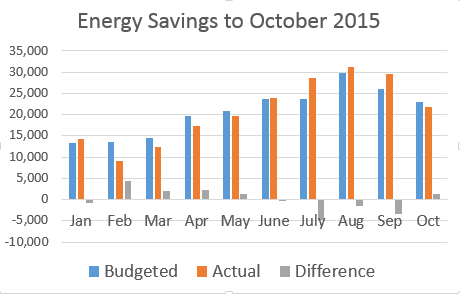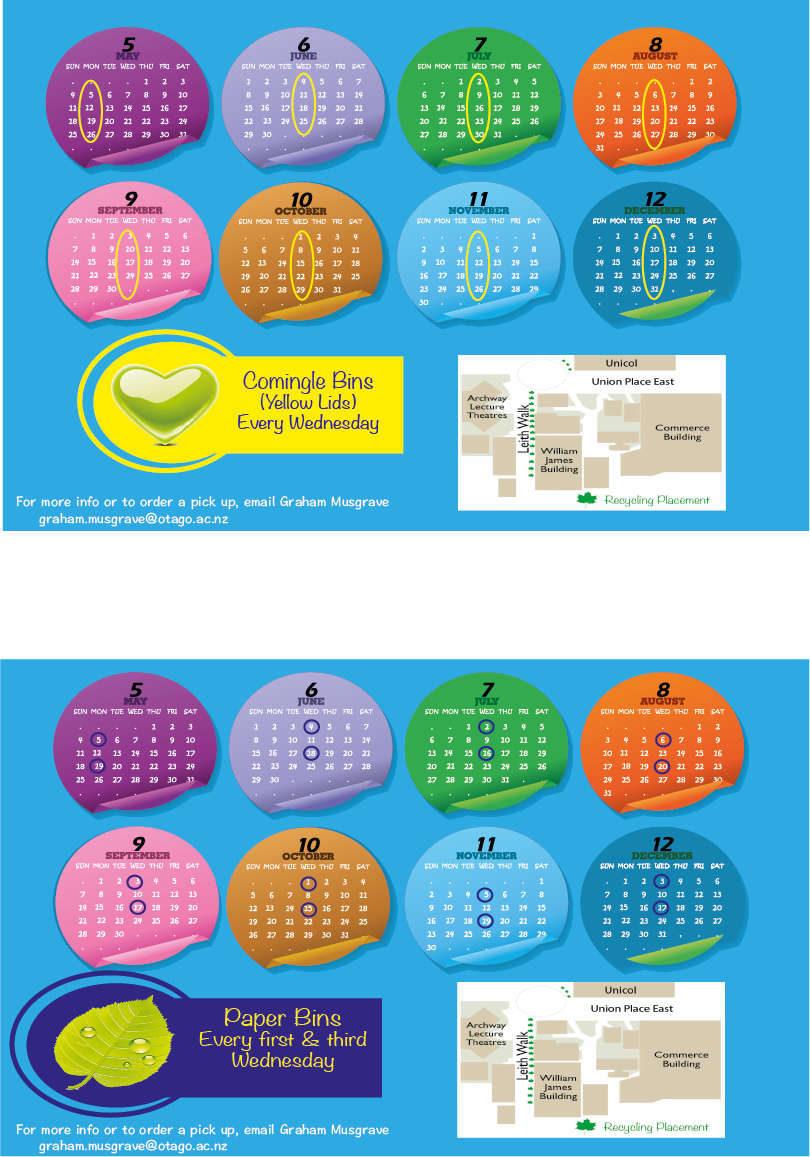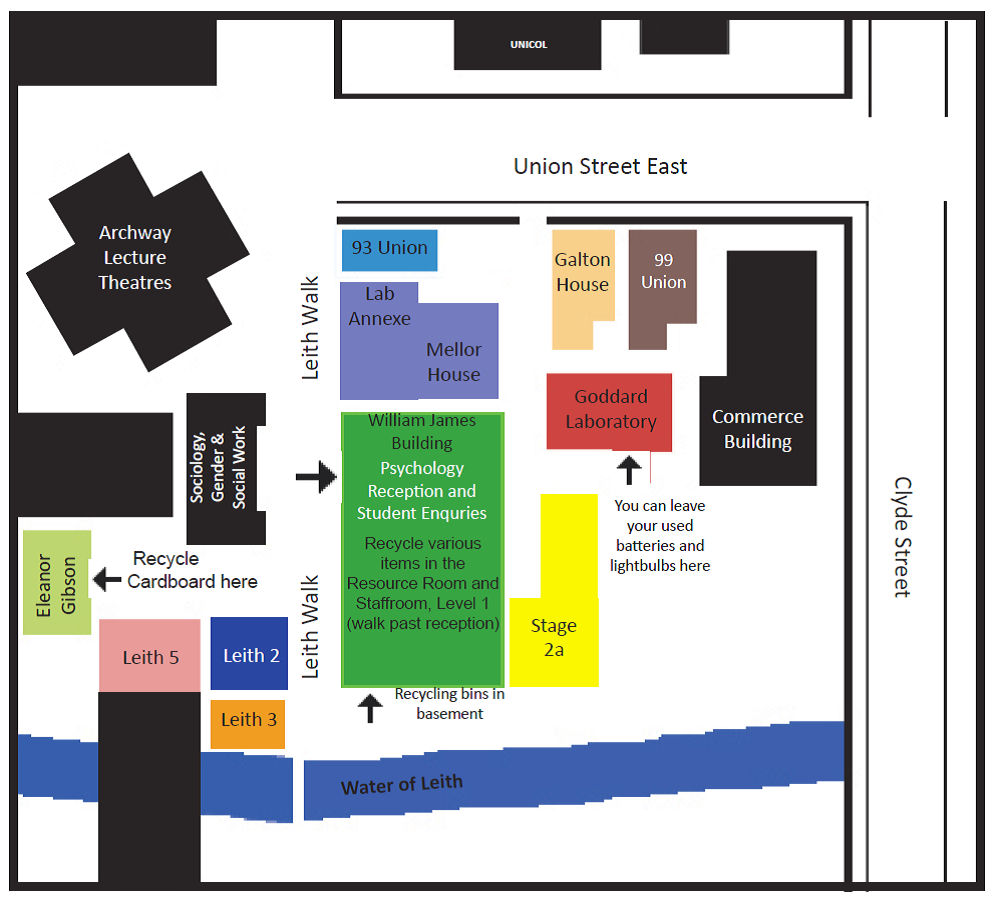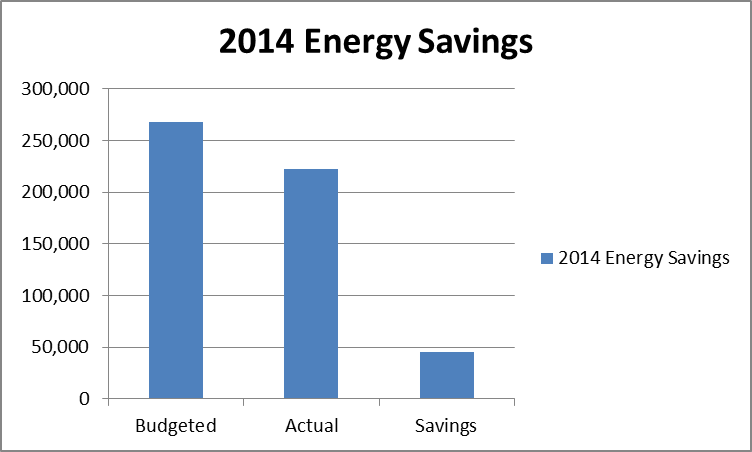Sustainability Initiatives in the Department of Psychology
The Department of Psychology is centred in the William James Building, a building with a 5-star environmental rating, and named after an American founding figure of psychology.
The quote by William James that flanks the building resonates with the importance of environmental sustainability:
“Where is it, this present? It has melted in our grasp, fled ere we could touch it, gone in the instant of becoming.”
The goal of the sustainability initiatives within the Department of Psychology is to maximise environmentally sustainable behaviours with the aim of reducing running costs at the same time. These initiatives were developed by the Psychology Environmental Action Squad (PEAS), which was started by Fiona Jack and continued by Jeremy Anderson (Senior Technician), Cara Duffy, Jules Gross, Ted Ruffman, Mele Taumoepeau, and Gareth Treharne.
What you can do to maximise environmental sustainability
Read our four top tips:
- Be aware of heater use: Heating is the biggest source of energy use in the University of Otago. Our buildings in the Department of Psychology use a range of heating sources, many of which can be manually adjusted. Use of extra heaters is not recommended due to energy usage and safety concerns. Personal heaters brought in from home should also not be used for safety reasons. Any problems with heating can be reported to our technical staff by emailing service@psy.otago.ac.nz.
- Reduce what resources you use: Environmental sustainability starts by minimising resource use. Try to avoid disposable resources if reusable alternatives are available. Think before you print – is it essential to have a paper copy?
- Recycle what waste you can: Environmental impact can also be minimised by recycling where possible. We aim to make recycling as convenient as possible around the Department of Psychology (see frequently asked questions).
- Raise awareness: Let people know about the environmental sustainability efforts of the Department of Psychology, and let us know if you have any suggestions or questions. One way we are raising awareness of energy use is by graphing our monthly consumption in the Department of Psychology. Reducing energy use provides direct savings that are put to good use.
Energy consumption savings year to date
This graph shows how much money the department has saved year to date through your increased consciousness to use less energy. It just goes to show that everyone saving a little really can make a huge difference.

Frequently asked questions
Should I switch my computer off at the end of every day?
No, certain computers in the Department of Psychology are backed up at night and this requires them to be left in sleep mode, so it's best to keep them all on. The network becomes inefficient if computers are being backed up during the day (eg, slow internet connection). A computer left in sleep mode uses around 35mA and a computer that is powered down around 30mA. In comparison, a typical heater uses around 10A (ie, 10,000mA) and so one unneeded heater is a much bigger concern. Please ask our technicians if you would like further information about managing the power settings of a computer.
The heating isn't working in a room, what should I do?
An adequately heated workplace is essential and it is more efficient to fix a main heater than use extra space heaters. If a room is notably cold or notably hot, please tell our technical staff (service@psy.otago.ac.nz).
I don't know how to annotate pdf documents, is there any training to help me become less reliant on printing?
IT Services run courses on creating and annotating pdfs.
Sign up for a course here
Where do I recycle paper?
There are blue bins throughout WJB for collection of paper for recycling. All other Psychology buildings should have either a wheelie bin or cardboard box for the collection of paper for recycling. If you have a large quantity, it can go straight to the paper skip in the waste collection room in the WJB basement.

Where do I recycle cardboard?
There is a large cardboard recycling bin outside the Eleanor Gibson Building.
Where do I recycle glass, cans and plastic?
Plastics 1-7, steel cans, aluminium cans, and glass bottles and jars can be recycled in the yellow bins in the staffroom. If you have large quantities of these materials, you can deliver them straight to the skip in the waste collection room in the WJB basement.
Where do I recycle polystyrene?
There is now a wheelie bin for this in the waste collection room in the WJB basement.
What can I do with food scraps, tea bags, coffee grinds and these dead flowers?
A bokashi organic recycling system is run by the cleaning staff and volunteers who take the waste away. The bins are located in the staff room (ground floor, William James Building). Please use the grey bin on the counter. Most organic matter can be composted using this system (see the list by the bin).
What can I do with dead batteries or light bulbs?
Batteries and many light bulbs should not be disposed of in regular waste as they leach toxins into landfill sites. Dead batteries can be left in the resource room (ground floor near reception, William James Building). CFL light bulbs/fluorescent tubes (and batteries) can be left with the technical staff in Goddard.
Map of recycling locations within the Psychology buildings

Bokashi Bin Composting
The PEAS committee has introduced the Bokashi Compost-Zing System to the department. It consists of just a few simple elements so it's really easy to use and is proving an effective and efficient form of composting our kitchen waste:
Two buckets are nested one upon the other. The outermost bucket has a tight fitting lid and the inner bucket has holes in the bottom to allow for drainage of any liquids into the outer bucket. This is drained regularly during the fermentation period.
A bag of Compost-Zing which when added to kitchen waste starts the fermentation process.
Compost-Zing is a unique in-house product used to recycle your kitchen waste into an organic soil conditioner. It consists of plant by-products inoculated and fermented with EM (Effective Microorganisms) EM is a complex culture of naturally occurring beneficial organisms which have a reviving effect on the environment. They help balance the microbial ecology of the soil when your fermented kitchen waste is added to the soil. They also help supply nutrients to your garden.
All of the following things can be added to the benchtop collection for the bokashi bins:
- Tea bags and coffee grounds
- Any food waste except bones and liquids
- Office plants you've killed or wilted flowers
Please don't put these things in the compost:
- Drinks stirrers/plastic spoons
- Any packaging
- Any liquids
- Any bones
- Paper
